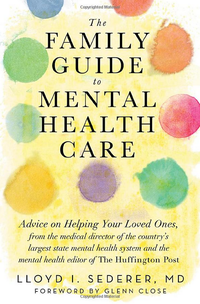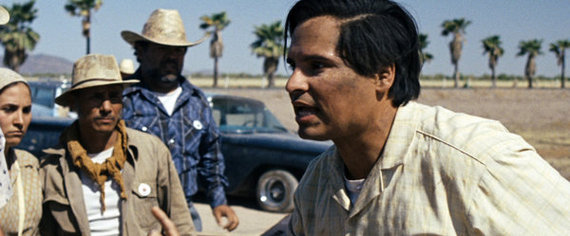How To Start A Movement
A movie review of Chavez
Lloyd I. Sederer, MD
"Si se puede!" Yes we can! Cesar Chavez asserts to a restive crowd of California migrant workers whose hope has worn too thin. Chavez has to keep their spirit and a movement alive that will deliver them from fear, child labor, inability to read and write, and the $2 a day in wages that are breeding another generation of shame, suffering and early death.
The recipe for a successful movement has been cleverly depicted in a three minute TED talk by Derek Sivers that has been viewed over 3.5 million times. Start with guts, courage that will be dearly tested, and fashion a message and a plan that is simple to understand and follow. But you can't do it alone: the essential next step is finding one follower so you are not alone, not a "lone nut." Then a third person is needed because three's a crowd -- and a crowd is newsworthy. The remaining ingredients (not in the TED talk) are unrelenting dedication, usually a fair amount of hardship and persecution, and time, with long days blending into years.
Cesar Chavez saw the shame in his father's eyes when the Great Depression robbed them of the family farm. The son's path, that of the hero he would become, was emblazoned into his soul at that mutative moment. Yet a hero's journey is not of his (or her) choosing but rather what is harnessed to him as an inescapable destiny. Chavez now bore his social and personal mission: serve the many, like his family, who did not have a fair shake and elude the ignominy that broke his father's soul.
Chavez died more than 20 years ago, so his legend is fading as a new generation searches for its heroes. His movement started in the disruptive 1960s and ran well into the 1970s when farmworkers gained the right to unionize that would make them a collective force able to battle the power of the growers, the police and the local judges. Because his movement was in California he had both Ronald Reagan (as governor) and Richard Nixon (as president) -- both Californians -- working to defeat him.
The person the filled the role of his first follower was his extraordinary wife, Helen -- she was the first to go to jail. His next follower, making a crowd, was Dolores Huertas, a civil rights organizer who later co-founded the National Farmworkers Association (the forerunner to the United Farm Workers). While Chavez could not do it alone it was his spirit that kept the light burning at the darkest moments.
Director Diego Luna brought together a terrific ensemble of actors. Michael Peña gives us an understated yet engrossing rendering of the eponymous Mexican-American icon. We see how his fire burns deep -- how it chars him, not only fuels his cause. America Ferrera is Helen, his devoted (but not obsequious) wife who struggled to keep her husband from the tragic fate of a saint. Rosario Dawson energetically plays Huertas with what surely must have been her indomitable spirit. The great scene stealer is John Malkovich, who with his trademark creepy aplomb portrays the evil of unbridled capitalism.
Luna's directing is strongest in the fields and worker rallies where we enter their lives and their journey to a better life. But efforts to make Cesar and Helen more familiar, more human, through a running narrative of their family, eight children, a father-eldest son struggle, and spousal arguments seem to slow the film down and dilute its forceful documentary-like edge.
Every hero's journey needs an enemy. But don't be fooled, it was not simply the first generation American grape grower patron, John Bogdonovich, who built an empire with his own willful industry. The greater and deeper enemy, Chavez proclaims, is the violence that must be battled. But not the violence perpetrated against the workers, which is grim to witness, but the violence that is kindled in them as impotence, humiliation and rage combust and then want to explode.
Chavez had his noble calling for justice and dignity. He had a humble demeanor to boot. Like Pope Francis and President Obama he too made Time magazine's cover as Man of The Year. But it was his method, elegantly simple to understand and follow, that jumps from the screen: don't eat grapes, or their wine products, sold by growers who exploit their workers. Boycotting could (and did) bring an industry to its knees as revenue, their oxygen, was cut off. When the movement hit a huge wall Chavez doubled down, borrowing from Gandhi and other saint-like figures, and stopped eating himself, everything but water, for 25 days. He had the entire country engaged in his battle. It didn't matter what side you were on, what mattered was his passion.
Chavez's movement was radical, dangerous, innovative -- and non-violent. It was the 60s and we had the Kennedys, Dr. King, Vietnam, civil rights for blacks, youth taking mostly pot and LSD, not performance enhancers or numbing narcotics, assassinations, the early Bob Dylan poetry of protest, and even health care reform (Medicare and Medicaid were enacted mid-decade). This film takes us into an era since unrivaled in its pursuit of social justice and human potential. Go see it for that history lesson and to witness the work of a master movement craftsman named Chavez.
.................
 Dr. Sederer's new book for families who have a member with a mental illness is The Family Guide to Mental Health Care (Foreword by Glenn Close).
Dr. Sederer's new book for families who have a member with a mental illness is The Family Guide to Mental Health Care (Foreword by Glenn Close).
www.askdrlloyd.com http://www.askdrlloyd.com
The opinions expressed here are solely mine as a psychiatrist and public health advocate. I receive no support from any pharmaceutical or device company.
Copyright Dr. Lloyd Sederer

